As Chad and I bike into Dar Salaam, the thatched roofs of circle huts gradually come into view above the fields of corn. Next to the houses unruly garden plots full of okra, bissap, eggplant and tomato compete with thick weeds. Mango, shea, fig and other trees I do not yet know sprinkle the landscape beyond the houses in every direction.
Houses here are organized into groupings around a courtyard or common area; compounds. Each of these is home to approximately one family, in a loose sense of the word. I count about 10-12 compounds in Dar Salaam, although sometimes the units are not clearly defined. There are said to be between 180 and 200 people living here, depending on the time of year.
Chad helped prepare the village to be a Peace Corps site. Thus he knows the people, and took me around to make my preliminary introductions. Greetings are very important in Senegalese culture. First we found my master farmer, Mamadou Minté, and after a beaming introduction, he took us straight out to the Master Farm[1], which is less than one year old[2]. This farm will surely be the focus of much of my work, and much trial and error during my service.
Biking out to the farm I began my orientation to the peripheral farmlands of Dar Salaam. Beyond a band of cornfields the land dips slightly, and in this wide basin I beheld a great, bright green field of rice.
This is a big deal in Senegal, where rice is the preferred grain, but almost impossible to grow in much of the country. The fields were proudly pointed out to me by each person I met in the village. The Master Farm is just beyond the rice, on a gentle slope.
As of yet, there is not much going on in the farm, but it is a good piece of land. A handful of Mango, banana, citrus, and papaya trees, though very young, are in the ground, and a half dozen beds have been dug and have vegetables growing. Much of the rest of the space is home to corn and peanut fields, per the traditional practice, and much is fallow.
Then we went to the chief of the village, who is the cousin of my master farmer and has the same name, and then to compound of my host family.
The compound is a lively place. My host dad has 3 wives (which means 3 host moms!), and more than a dozen kids. I am impressed every day by the generosity, energy and compassion of these three women, Fatumata, Bintu and Aminata. In addition to their own kids and husband, they also cook for me, and an additional 20-25 other mouths for every single meal, over open woodfire, pounding all of their own corn and rice for every meal by mortar and pestal. Yet they still find time to cultivate numerous beautiful gardens, make shea butter, walk all the way to Kedougou to sell vegetables a couple times a week, and perform a wide variety of other tasks, and they still have the patience to hang out and talk with me and answer my dozens of frustratingly basic questions about the Jaxanké language. I have no words to describe my respect for these women.
When I met him my new host dad introduced himself as Ousmane Minté, and donned me his Toxoma (Namesake).
Henceforth, I am Ousmane Minté.
Ousmane is an Imam— an Islamic religious leader/teacher—in addition to farming corn, rice and peanuts. He runs the Koranic school in Darou Salaam, and hosts about 20 Koranic students known as Talibés in a dormitory style building in our compound, opposite my hut. That makes perhaps 35-40 residents in my compound alone. Suddenly this village of 200 did not feel so small.
The Talibé Koranic school system has been the subject of considerable controversy in Senegal in recent years. I will attempt to treat it with prudence.
Talibé is Arabic for ‘student who has travelled to learn.’ They are all male. The Talibé system is a long, complex story. It is not unique to Senegal. Talibé systems of various kinds exist in a number of other Muslim countries.
The gist is this: families (sometimes, but not necessarily generally poor) hear of an imam in a city or village somewhere that will host children, feed them and school them on the Koran in exchange for work. Perhaps there is a familial connection. Perhaps it is only a vague notion of a generous and wise religious leader. Often the connection is related to whichever brotherhood the family adheres to. (This—the system of Sufi brotherhoods in Senegal— is another, complex and interesting topic.)
The students then go to live with the Imam, or at least in his village, and divide their time between learning a trade, generally farming, and the Koran. This is the traditional notion of the Talibé system. Today however, in many parts of the country, particularly urban centers, the system is unrecognizable to what it once was, having been twisted by corruption and abuse into a system of parasitical patronage.
This is where things get complicated. I highly suggest this short essay as an introduction to/example of the urban Talibé system, and its fall from grace. http://www.talibes.org/2013/10/26/history-of-the-talibe-system-in-saint-louis/
Talibés face a frightening reality in the cities, where they are essentially forced to abuse the ubiquitous Muslim generosity of alms, while the Imam lives comfortably off of the appropriated profits.
Obviously this is a somewhat simplified, and generalized story. It is not easy to render such a complex situation to in any way. It is also important to emphasize that the Talibé as a system of blatantly corrupt patronage and (arguably) quasi child slavery is almost uniquely an urban phenomenon. The Talibé school of Dar Salaam, my village, is of a different breed. In my opinion, urban and rural Talibés deserve different appellations.
In Darou Salaam the children, learn, unambiguously, about farming. They are in the fields every day, and learn first hand from accomplished farmers. Much of this is mundane manual labor, but it is a concrete and productive skill nonetheless. The world needs farmers. I have no doubt that working with these kids to enrich the depth and diversity of their knowledge and understanding of agriculture will factor heavily into my service. They are also great kids to hang out with, eat peanuts and practice language.
I cannot, on the other hand, speak to the quality of their Koranic education, but Ousmane, my host father and their imam is a good man, and I know he is doing what he can.
However, for what I can tell, the Koranic learning is mostly cursory memorization of Arabic phrases. It does not seem as though the students really know what they are saying much less how to read or write the prayers, verses, and stories of Islam.
This also means, since there is no French school in the village, that none of the kids are gaining any literacy in French or the Latin script. As far as I can tell there is one person in my village who can read or speak French, including the adults. I hesitate, I really do, to renounce full cultural relativism and implicate that the knowledge of French is more important, or useful than Arabic. My approach is to try to think about (1) how the languages are taught and (2) what their knowledge allows the student to do/accomplish.
Unfortunately the teaching of French here does involve a good amount of rote memorization as well, but it is undeniably less. Also, there are many more opportunities to practice the French language, since it is the most common written language, used for news, advertisements, etc. Thus learning it in school is a great deal more likely to lead to real literacy. As far as the advantages to learning a language, knowing French opens the door to far more influences and perspectives than Arabic in Senegal. This is just a simple fact of the available literature, education, and business opportunities in this country—it is French, and not Arabic that opens the door to a diversity of knowledge.
The obvious and irrefutable retort here is that the word of God is not written in French, and apparently cannot be, and knowing this is of far greater consequence than any literature or worldly information. I can only suggest here that Islamic scholars may well have developed the scientific method, and contributed formidably to other realms of thought such as logic and mathematics while France was ruled by barbarians. Scientific inquiry is arguably a fundamental and necessary part of Islam, as the Koran instructs the reader to come to know, through study, the world of God’s creation.[3] It can also be said that Arabic is a great language of learning, and there is no shortage of books about all topics published in this language.
The simple fact, however, responding to both of these, is that in Senegal knowledge about the wider world is much more available in French than Arabic.
It is also true that these are both languages of invasive cultural and political hegemonic powers, past and present. So I guess you just have to pick your poison.
Nonetheless, compared to other examples of the Talibé school system in Senegal, the Islamic pedagogy of Dar Salaam seems to do a better job than most. The boys do not beg, and they are learning how to farm. Sometimes, that may be all you can hope for.
[1]“The Master Farmer program is a joint effort between Peace Corps Senegal and the U.S. Agency for International Development in Senegal that seeks to improve local communities’ food security by developing a plot of land for demonstration and training.” (http://www.peacecorps.gov/media/forpress/press/2253/) Basically the Peace Corps pays to build a solid fence around a hectacre of land, and a well, as well as some fruit trees to get things started. Then they support the master farmer in developing the area to be an example of (whatever they decide to be) good agricultural practices for the community. They do this through trainings and seed extension, but mostly though grass roots community involvement and participation. (AKA my job)
Houses here are organized into groupings around a courtyard or common area; compounds. Each of these is home to approximately one family, in a loose sense of the word. I count about 10-12 compounds in Dar Salaam, although sometimes the units are not clearly defined. There are said to be between 180 and 200 people living here, depending on the time of year.
 |
| Rice Fields |
Biking out to the farm I began my orientation to the peripheral farmlands of Dar Salaam. Beyond a band of cornfields the land dips slightly, and in this wide basin I beheld a great, bright green field of rice.
This is a big deal in Senegal, where rice is the preferred grain, but almost impossible to grow in much of the country. The fields were proudly pointed out to me by each person I met in the village. The Master Farm is just beyond the rice, on a gentle slope.
As of yet, there is not much going on in the farm, but it is a good piece of land. A handful of Mango, banana, citrus, and papaya trees, though very young, are in the ground, and a half dozen beds have been dug and have vegetables growing. Much of the rest of the space is home to corn and peanut fields, per the traditional practice, and much is fallow.
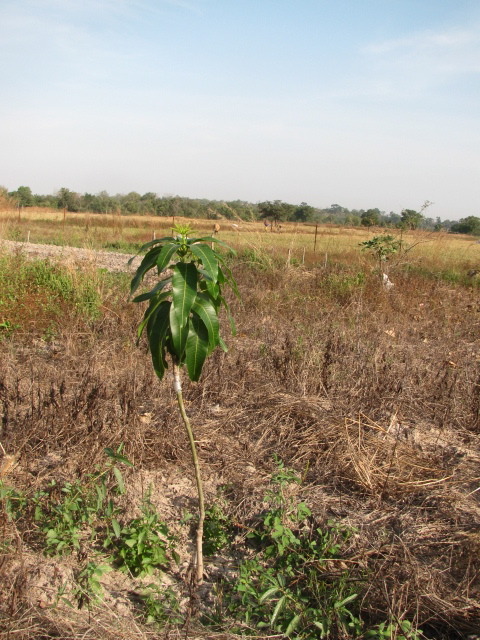 |
| A young mango tree |
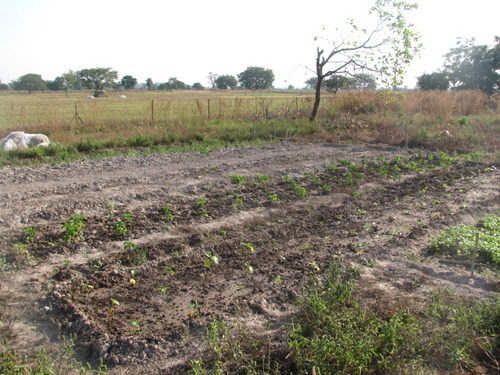 |
| Beds of pepper and Jaxatu in the Master Farm |
The compound is a lively place. My host dad has 3 wives (which means 3 host moms!), and more than a dozen kids. I am impressed every day by the generosity, energy and compassion of these three women, Fatumata, Bintu and Aminata. In addition to their own kids and husband, they also cook for me, and an additional 20-25 other mouths for every single meal, over open woodfire, pounding all of their own corn and rice for every meal by mortar and pestal. Yet they still find time to cultivate numerous beautiful gardens, make shea butter, walk all the way to Kedougou to sell vegetables a couple times a week, and perform a wide variety of other tasks, and they still have the patience to hang out and talk with me and answer my dozens of frustratingly basic questions about the Jaxanké language. I have no words to describe my respect for these women.
When I met him my new host dad introduced himself as Ousmane Minté, and donned me his Toxoma (Namesake).
Henceforth, I am Ousmane Minté.
Ousmane is an Imam— an Islamic religious leader/teacher—in addition to farming corn, rice and peanuts. He runs the Koranic school in Darou Salaam, and hosts about 20 Koranic students known as Talibés in a dormitory style building in our compound, opposite my hut. That makes perhaps 35-40 residents in my compound alone. Suddenly this village of 200 did not feel so small.
The Talibé Koranic school system has been the subject of considerable controversy in Senegal in recent years. I will attempt to treat it with prudence.
Talibé is Arabic for ‘student who has travelled to learn.’ They are all male. The Talibé system is a long, complex story. It is not unique to Senegal. Talibé systems of various kinds exist in a number of other Muslim countries.
The gist is this: families (sometimes, but not necessarily generally poor) hear of an imam in a city or village somewhere that will host children, feed them and school them on the Koran in exchange for work. Perhaps there is a familial connection. Perhaps it is only a vague notion of a generous and wise religious leader. Often the connection is related to whichever brotherhood the family adheres to. (This—the system of Sufi brotherhoods in Senegal— is another, complex and interesting topic.)
The students then go to live with the Imam, or at least in his village, and divide their time between learning a trade, generally farming, and the Koran. This is the traditional notion of the Talibé system. Today however, in many parts of the country, particularly urban centers, the system is unrecognizable to what it once was, having been twisted by corruption and abuse into a system of parasitical patronage.
This is where things get complicated. I highly suggest this short essay as an introduction to/example of the urban Talibé system, and its fall from grace. http://www.talibes.org/2013/10/26/history-of-the-talibe-system-in-saint-louis/
Talibés face a frightening reality in the cities, where they are essentially forced to abuse the ubiquitous Muslim generosity of alms, while the Imam lives comfortably off of the appropriated profits.
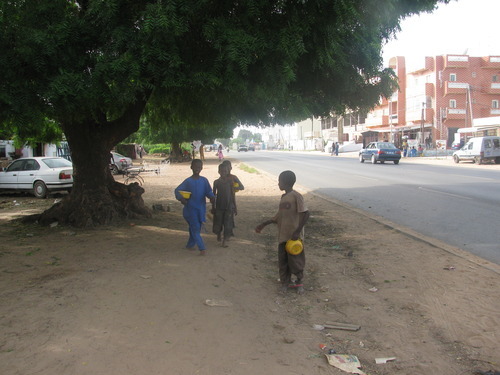 |
| Talibé boys in M'bour. The ubiquitous yellow bowls are virtually their only possession |
In Darou Salaam the children, learn, unambiguously, about farming. They are in the fields every day, and learn first hand from accomplished farmers. Much of this is mundane manual labor, but it is a concrete and productive skill nonetheless. The world needs farmers. I have no doubt that working with these kids to enrich the depth and diversity of their knowledge and understanding of agriculture will factor heavily into my service. They are also great kids to hang out with, eat peanuts and practice language.
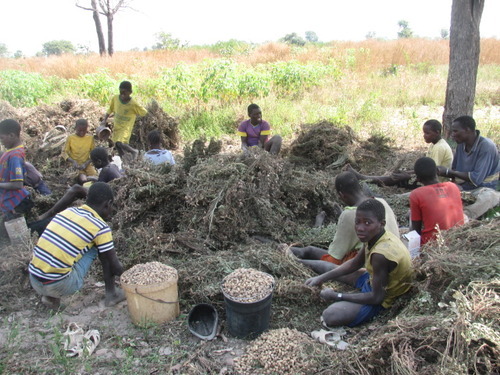 |
| Pulling peanuts in the Master Farm |
However, for what I can tell, the Koranic learning is mostly cursory memorization of Arabic phrases. It does not seem as though the students really know what they are saying much less how to read or write the prayers, verses, and stories of Islam.
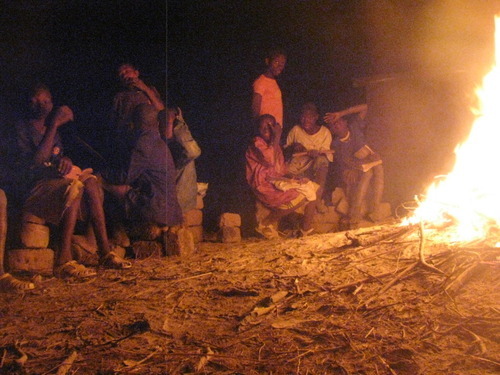 |
| Studyin the Koran by the light of a bonfire. Every night. |
Unfortunately the teaching of French here does involve a good amount of rote memorization as well, but it is undeniably less. Also, there are many more opportunities to practice the French language, since it is the most common written language, used for news, advertisements, etc. Thus learning it in school is a great deal more likely to lead to real literacy. As far as the advantages to learning a language, knowing French opens the door to far more influences and perspectives than Arabic in Senegal. This is just a simple fact of the available literature, education, and business opportunities in this country—it is French, and not Arabic that opens the door to a diversity of knowledge.
The obvious and irrefutable retort here is that the word of God is not written in French, and apparently cannot be, and knowing this is of far greater consequence than any literature or worldly information. I can only suggest here that Islamic scholars may well have developed the scientific method, and contributed formidably to other realms of thought such as logic and mathematics while France was ruled by barbarians. Scientific inquiry is arguably a fundamental and necessary part of Islam, as the Koran instructs the reader to come to know, through study, the world of God’s creation.[3] It can also be said that Arabic is a great language of learning, and there is no shortage of books about all topics published in this language.
The simple fact, however, responding to both of these, is that in Senegal knowledge about the wider world is much more available in French than Arabic.
It is also true that these are both languages of invasive cultural and political hegemonic powers, past and present. So I guess you just have to pick your poison.
Nonetheless, compared to other examples of the Talibé school system in Senegal, the Islamic pedagogy of Dar Salaam seems to do a better job than most. The boys do not beg, and they are learning how to farm. Sometimes, that may be all you can hope for.
[1]“The Master Farmer program is a joint effort between Peace Corps Senegal and the U.S. Agency for International Development in Senegal that seeks to improve local communities’ food security by developing a plot of land for demonstration and training.” (http://www.peacecorps.gov/media/forpress/press/2253/) Basically the Peace Corps pays to build a solid fence around a hectacre of land, and a well, as well as some fruit trees to get things started. Then they support the master farmer in developing the area to be an example of (whatever they decide to be) good agricultural practices for the community. They do this through trainings and seed extension, but mostly though grass roots community involvement and participation. (AKA my job)
[2] The story of the development of the Darou Salaam as a Master Farm/Peace Corps site is rather amusing. As is stated above, the Master Farm program is funded by US AID funds. These are contingent funds, meaning that the money is available to be spend for a period of time, and if it is not used, or at least contracted within that time frame, the opportunity is lost. The Senegal MF national coordinator called a volunteer in Kedougou in February or March of 2013 and said, ‘you have one week to find a new Master Farm site in the Central Kedougou work zone.’ So the volunteers in the area scrambled to make that happen, and Darou Salaam was selected, hastily, and perhaps out of necessity, but not without good reason; it is a wonderful village.
[3] http://en.wikipedia.org/wiki/Islam_and_science